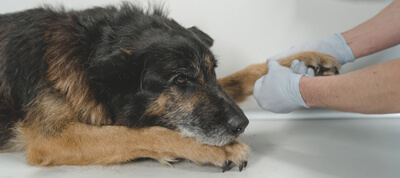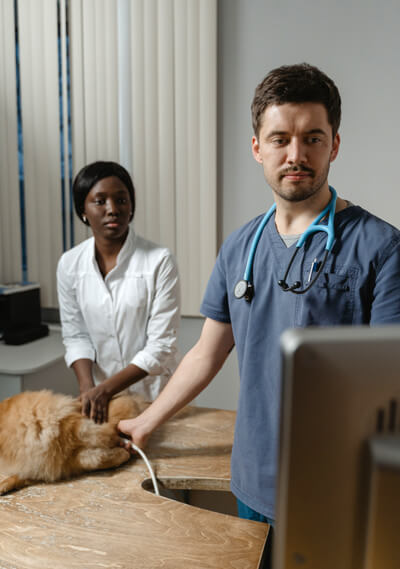Veterinary Transcription
Peachtree Transcription Documentation Services
Are you passionate about veterinary care to help pets and their people, or are you passionate about paperwork?
Peachtree Transcription benefits your doctors by eliminating the need to sit in front of a computer documenting patient records. Using a mobile app, documenting is completed in 60 seconds or less. The mobile application gives you the ability to work form anywhere. Less time spent recording patient records in the EHR or PIM results in more time to provide excellent care for your furry family members.
Benefits From Veterinary Documentation
Save Doctors Time
Veterinary transcription services from Peachtree result in doctors, seeing 24 patients daily, saving 5 minutes per patient, or 120 minutes daily. What would you do with an extra two hours daily? Free yourself from late nights in front of the computer, speaking unnaturally, or saying punctuation. Capture chart notes faster than typing, editing, or handwriting them. Peachtree’s veterinary documentation service allows charting patient encounters in seconds, not minutes.
Mobile App
Work From anywhere with a mobile app. Dictate with ease from multiple locations using an industry-leading cloud-based mobile dictation platform. Peachtree Transcription utilizes an effective and easy-to-use mobile dictation platform for medical professionals to record notes remotely. With the mobile application, doctors can seamlessly dictate anywhere, from multiple offices to remote locations, with ease. The application resides on the cloud and is available on almost any Android or IOS device. Within seconds you can dictate the chart note, press the send button, and confidently know that an exact copy of that note will be available within the time frame you specified.
Compliant Veterinary Records
Every state has laws regarding the release of veterinary patient records. Iowa, for example, requires the release of those medical records to the pet owner within two business days of the written request. With the COVID-19 pandemic came an increase in pet ownership, which has increased the patient load demands on your veterinary practice. Charting can take up a lot of your time, and it’s easy to fall behind as the new walk-in patients flow into your practice. That’s where Peachtree Transcription helps your veterinarian practices by providing fast and accurate documentation that allows animal practitioners more time to take care of animals. Peachtree Transcription provides guaranteed, quality transcription services, customized to your veterinary needs. Also, Peachtree Transcriptions’ excellent customer service goes above and beyond your expectations.
As a Veterinarian, you are obligated to keep all of your patient’s records confidential except by court order or consent by the owner of the animal. What’s good for human medicine, is also good for veterinary medicine. Therefore, we utilize HIPAA compliant technology that offers top-notch privacy and security. With the technology used in human medicine, we offer the capability to dictate anywhere/anytime, listen to dictation through a secure web browser, and monitor dictation online. Internet-based services also allow you to view, edit, and print the completed transcriptions at your convenience.
Only Pay For What You Use
Peachtree Transcription doesn’t charge any setup fees, and you only pay for what you use. Therefore we do not charge a monthly minimum or have contract termination fees.
Veterinary Services We Specialize In
Whether you are a 24/7 Veterinary Hospital or a 9-5 animal clinic, we can help your doctors save time. We provide services for the following AVMA–Recognized specialties:

Anesthesia and analgesia: Veterinary specialists that are experts at assessment and mitigation of anesthetic risks, delivery of anesthetic and analgesic drugs, maintaining and monitoring physiologic well-being of the anesthetized patient, and providing the highest levels of perioperative patient care including pain management.
Dentistry: Veterinarians that specialize in the diagnosis and treatment of dental, oral, and maxillofacial diseases.
Dermatology: Veterinary specialists with advanced training and expertise in the diagnosis and treatment of allergies and diseases affecting the skin, ears, nails, and/or hooves of animals.
Emergency and critical care: Veterinary specialists who work exclusively in emergency rooms and intensive care units to care for animals that are often the “sickest of the sick”.
Cardiology: Veterinary specialists who diagnose and treat conditions of the heart and circulatory system.
Internal Medicine: Veterinary specialists trained to manage complex medical problems or disease conditions affecting multiple body systems.
Neurology: Veterinary specialists who diagnose and treat diseases of the brain, spinal cord, and other parts of the nervous system.
Oncology: Veterinary specialists who diagnose and treat cancer.
Laboratory animal medicine: Veterinary specialists working in research or in practice, making sure laboratory animal species (rabbits, rats, mice, etc.) receive proper care.
Ophthalmology: Veterinary specialists who study diseases and conditions of the eye.
Pathology: Veterinary specialists practicing microscopic and clinical pathology to protect and improve animal, human and environmental health to benefit society.
Pharmacology: Veterinary specialists who study how medications/drugs affect animals.
Poultry: Veterinary specialists who work with chickens, turkeys, ducks, and other fowl, usually in food production settings.
Preventive medicine: Veterinary specialists that improve animal, human, and environmental health through surveillance, recognition, outbreak investigation, and management of animal diseases; prevention and control of zoonotic diseases and foodborne illnesses; reduction of bites, injuries, and other environmental and occupational human health hazards related to animals; promotion of food protection and wholesomeness; and promotion of humane animal care and the use of animals in animal-facilitated therapy.
Radiology: Veterinary specialists who focus on the study of x-ray, ultrasound, computed tomography (CT), magnetic resonance imaging (MRI), and other imaging procedures that allow us to see “inside” an animal’s body; radiation oncologists specialize in the treatment of cancer patients using radiotherapy.
Sports medicine and rehabilitation: Veterinary specialists that focus on returning animals to normal function after injury, lameness, illness, or surgery.
Surgery: Veterinarians who specialize in performing surgery. A certified surgeon will be certified in either small animal or large animal surgery. Within these groups, many surgeons will focus their work in a sub-category, but they are not limited to them:
Orthopedics: Veterinary surgeons that focus on the bones, joints, ligaments, muscles, and tendons that make up the body’s skeletal system.
Soft Tissue Surgery: Veterinary surgeons specialize in the internal organs and non-bone tissues of the body.
Neurosurgery: Veterinary surgeons that focus on the brain, spinal cord, and other parts of the nervous system.
Contact Us To Learn More

